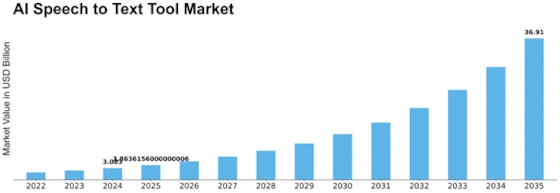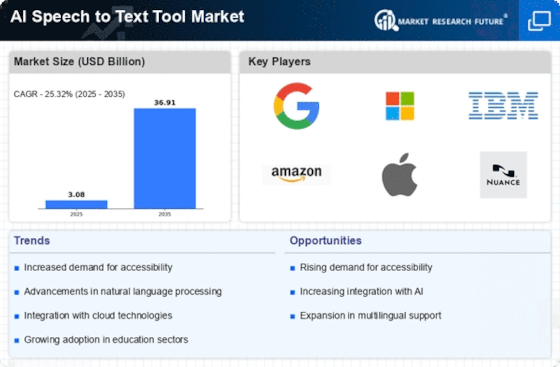Ai Speech To Text Tool Size
AI Speech to Text Tool Market Growth Projections and Opportunities
Several market variables promote AI speech-to-text tool growth and acceptance. These drivers include technical advances, expanding need for transcription and accessibility, voice powered devices, and quick and accurate speech to text conversion.
AI speech to text tool market growth depends on technology. AI voice to text solutions improve at interpreting and transcribing spoken language as AI and NLP technology advance. AI voice to text technologies can now accurately turn speech into text even in noisy or accented contexts. AI voice to text solutions are more dependable and efficient due to advances in machine learning algorithms and neural networks, which improve speech recognition accuracy and speed. These technical advances improve speech to text conversion accuracy and efficiency, driving the AI speech to text t tool industry.
AI speech to text systems benefit from rising transcription and accessibility demand. The healthcare, legal, media, and education sectors seek transcription services. AI speech to text systems eliminate manual transcription of audio and video content and save money. Real-time captions or subtitles for hearing impaired users make these products more accessible. AI voice to text systems are adopted by companies and people that need effective and inclusive transcribing services and accessibility.
Rising voice powered device use affects the AI speech to text tool business. Recently, voice assistants and speech controlled gadgets like smart speakers and smartphones have become popular. Devices use voice recognition and speech to text conversion for hands free interaction and command execution. Voice powered gadgets use AI speech to text capabilities to comprehend and respond to spoken commands. AI speech to text technologies are adopted as voice-powered gadgets become more popular and accurate speech recognition is needed.
Another market driver of AI speech to text solutions is the necessity for efficient and accurate conversion. Manual transcription or voice recognition software can be time-consuming and error prone. AI voice to text solutions use complex algorithms and deep learning to accurately convert speech to text in real-time or post processing. These techniques improve speech to text conversion accuracy and efficiency with speaker recognition, punctuation, and contextual comprehension. In order to quickly and accurately transform spoken input into written text, enterprises and individuals utilize AI speech to text applications.



















Leave a Comment